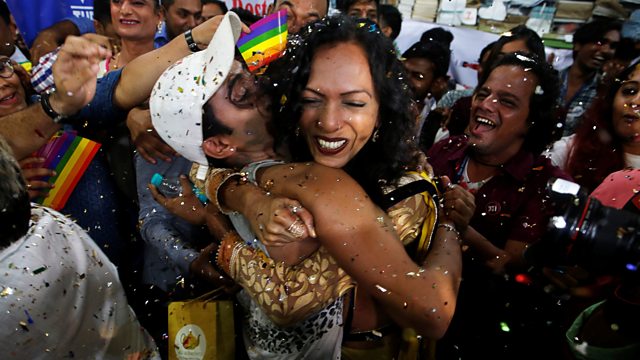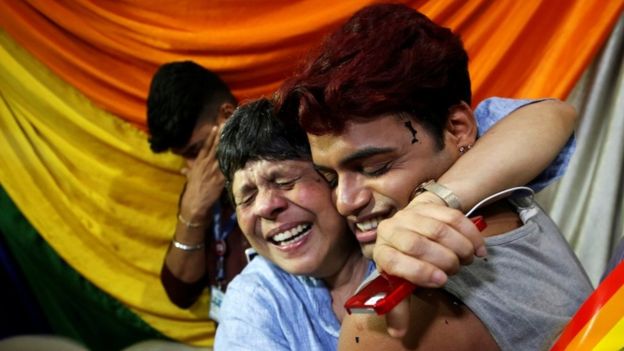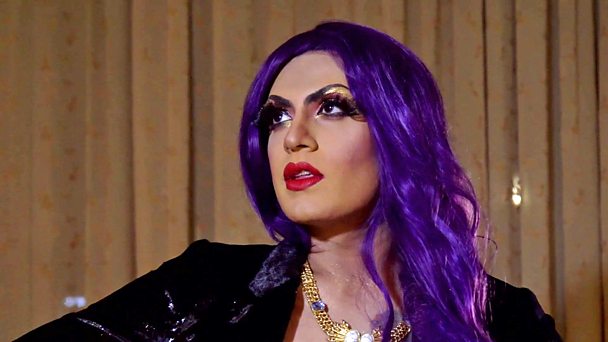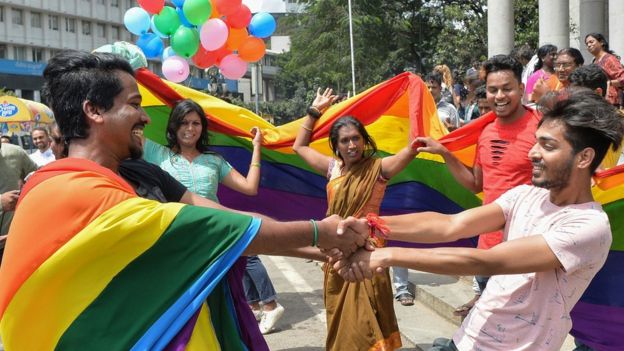India Court Legalises Gay Sex in Landmark Ruling
HUMAN RIGHTS, BRICS, JUSTICE, SEXUALITIES, 10 Sep 2018
BBC News – TRANSCEND Media Service
6 Sep 2018 – In a historic decision, India’s Supreme Court has ruled today that gay sex is no longer a criminal offence.
The ruling overturns a 2013 judgement that upheld a colonial-era law, known as section 377, under which gay sex is categorised as an “unnatural offence”.
The court has now ruled discrimination on the basis of sexual orientation is a fundamental violation of rights.
Campaigners outside the court cheered and some broke down in tears as the ruling was handed down.
Although public opinion in India’s biggest cities has been in favour of scrapping the law, there remains strong opposition among religious groups and in conservative rural communities.
- Joy in India as gay sex legalised
- The privacy case that paved the way
- How previous ruling shocked the gay community
- Where in the Commonwealth is gay sex illegal?
But this ruling, from the top court, is the final say in the matter and represents a huge victory for India’s LGBT community.
One activist outside the court told the BBC: “I hadn’t come out to my parents until now. But today, I guess I have.”
What have the judges said?
Today’s decision was delivered by a five-judge bench headed by India’s outgoing chief justice Dipak Misra and was unanimous.
Reading out the judgement, he said: “Criminalising carnal intercourse is irrational, arbitrary and manifestly unconstitutional.”
Another judge, Indu Malhotra, said she believed “history owes an apology” to LGBT people for ostracising them.
Justice DY Chandrachud said the state had no right to control the private lives of LGBT community members and that the denial of the right to sexual orientation was the same as denying the right to privacy.
The ruling effectively allows gay sex among consenting adults in private.
What is section 377?
It is a 157-year-old colonial-era law which criminalises certain sexual acts as “unnatural offences” that are punishable by a 10-year jail term.
The law punishes, in its own words, “carnal intercourse against the order of nature with any man, woman or animal”.
While the statute criminalises all anal and oral sex, it has largely affected same-sex relationships.
Human rights groups say police have used the statute to harass and abuse members of the LGBT community.
*****************************
‘Recognising everyone’s right to love’
Geeta Pandey, BBC News, Delhi
Even though it was rarely invoked when it involved consenting adults, section 377 could be – and was sometimes – used as a tool for harassment. It is not surprising then that campaigners are describing the verdict as a “new dawn for personal liberty”.
But in a largely conservative India, where leaders of all religions have consistently opposed gay sex, it will still be a while before attitudes change and the community finds full acceptance.
But laws almost always play an important role in changing mindsets, and by recognising the community’s right to love, the Supreme Court has restored the dignity denied to them for a very long time.
*****************************
How did we get to this point?
It’s been a tortuous route. A bid to repeal section 377 was initiated in 2001 and was batted between court and government until 2009, when the Delhi High Court ruled in favour of decriminalisation.
Several political, social and religious groups then mobilised to restore the law and in 2013 the Supreme Court struck down the High Court ruling.
Anti-section 377 activists then submitted a “curative petition” – a formal request to review an earlier court order perceived as a “miscarriage of justice” – and in 2016 the Supreme Court decided to revisit its ruling.
What has the LGBT reaction been to the latest ruling?
One of joy given that the community has fought vigorously to strike down the law.
Equal rights activists had argued that the very existence of such a law was proof of discrimination based on sexual orientation.
LGBT activist Harish Iyer told the BBC: “I’m absolutely elated. It’s like a second freedom struggle where finally we have thrown a British law out of this country… I think the next step would be to get anti-discrimination laws in place, or anti-bullying laws.”
Messages of support were posted on Twitter, including from film director Karan Johar:
https://twitter.com/karanjohar/status/1037587979265564672?ref_src=twsrc%5Etfw%7Ctwcamp%5Etweetembed%7Ctwterm%5E1037587979265564672%7Ctwgr%5E373939313b636f6e74726f6c&ref_url=https%3A%2F%2Fwww.bbc.co.uk%2Fnews%2Fworld-asia-india-45429664
Journalist Anna MM Vetticad said India had been saved from its shame:
We are witnessing history being made. Hats off to all my #LGBT rights activist friends who have battled hard to get here. You have saved India from the shame of being one of the remaining countries in the world that criminalises #homosexuality – thank you for that. #Section377
— Anna MM Vetticad (@annavetticad) September 6, 2018
How have political parties reacted?
The governing BJP party has said it would leave the decision to the Supreme Court.
However, one of its members said he was disappointed with the verdict.
Subramanian Swamy, known for making provocative comments, said: “It could give rise to an increase in the number of HIV cases.”
Meanwhile, the main opposition Congress party has welcomed the ruling, saying they “hope this is the beginning of a more equal and inclusive society”.
The UN has also welcomed the ruling, saying “sexual orientation and gender expression form an integral part of an individual’s identity the world over”.
What else was said in the ruling?
The court said other aspects of section 377 dealing with unnatural sex with animals and children would remain in force.
The judges also explicitly said that they only ruled on the constitutional validity of section 377 and were not looking at it in terms of other rights such as those related to marriage or inheritance.
It remains too early to say what this will translate to in the longer term.
Author and commentator Sandip Roy told the BBC that although the ruling was a cause for celebration, there were still hurdles to overcome, and a need for anti-discrimination laws.
“I think we would be foolish to think that this is the end of the fight,” he said.
Where is homosexuality illegal?
The 2017 report from the International Lesbian, Gay, Bisexual, Trans and Intersex Association (Ilga) lists 72 countries and territories where same-sex relationships are still criminalised, although that includes India before its latest ruling.
Most of them are in Africa, the Middle East and other parts of south Asia.
The report said homosexuality could still result in the death penalty in eight nations.
DISCLAIMER: The statements, views and opinions expressed in pieces republished here are solely those of the authors and do not necessarily represent those of TMS. In accordance with title 17 U.S.C. section 107, this material is distributed without profit to those who have expressed a prior interest in receiving the included information for research and educational purposes. TMS has no affiliation whatsoever with the originator of this article nor is TMS endorsed or sponsored by the originator. “GO TO ORIGINAL” links are provided as a convenience to our readers and allow for verification of authenticity. However, as originating pages are often updated by their originating host sites, the versions posted may not match the versions our readers view when clicking the “GO TO ORIGINAL” links. This site contains copyrighted material the use of which has not always been specifically authorized by the copyright owner. We are making such material available in our efforts to advance understanding of environmental, political, human rights, economic, democracy, scientific, and social justice issues, etc. We believe this constitutes a ‘fair use’ of any such copyrighted material as provided for in section 107 of the US Copyright Law. In accordance with Title 17 U.S.C. Section 107, the material on this site is distributed without profit to those who have expressed a prior interest in receiving the included information for research and educational purposes. For more information go to: http://www.law.cornell.edu/uscode/17/107.shtml. If you wish to use copyrighted material from this site for purposes of your own that go beyond ‘fair use’, you must obtain permission from the copyright owner.
Read more
Click here to go to the current weekly digest or pick another article:
HUMAN RIGHTS:
- How the Human Rights Industry Manufactures Consent for “Regime Change”
- Genocide Emergency: Gaza and the West Bank 2024
- ‘We Will Leave When the Last Palestinian Leaves’: The Defiant Last Stand of the Doctors of Kamal Adwan Hospital
BRICS:
- The “BRICS Sovereigns” vs the “Globalist Oligarchy”
- Cuba Joining BRICS Is a Lifeboat for Its Economy
- BRICS and G20 Value Platforms: A Comparative Analysis
JUSTICE:
- Statement of the ICC Office of the Prosecutor on the Arrest of Former Philippine President Rodrigo Roa Duterte
- Ireland Formally Joins ICJ Genocide Case against Israel
- Good and Bad War Criminals
SEXUALITIES:



